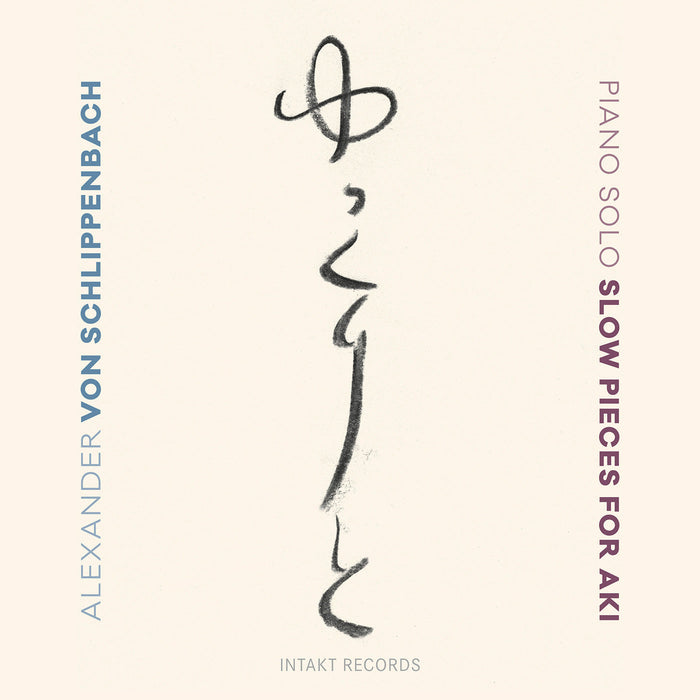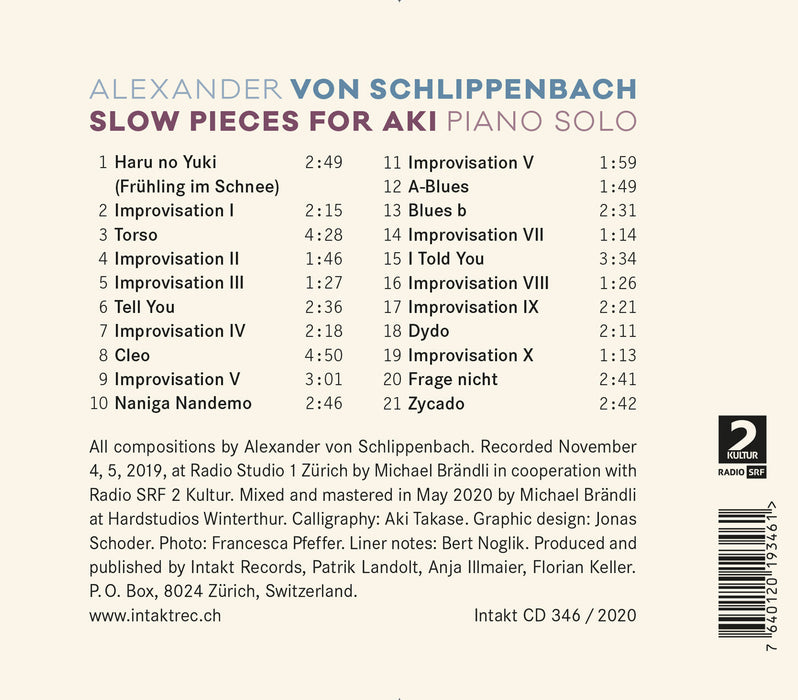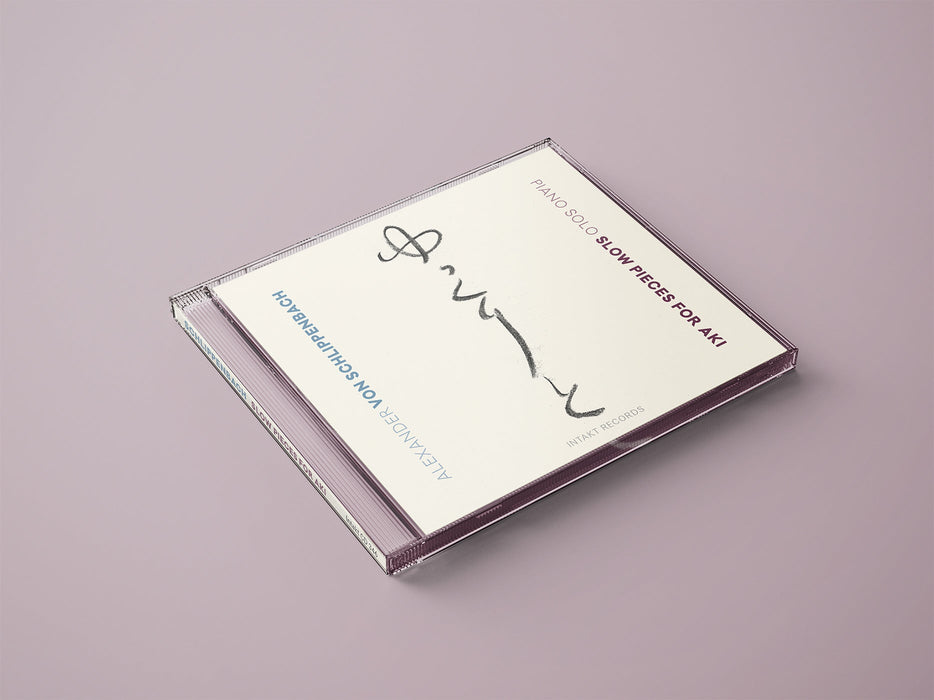


346: ALEXANDER VON SCHLIPPENBACH. Slow Pieces For Aki – Piano Solo
Intakt Recording #346/ 2020
Alexander von Schlippenbach: Piano
More Info
Der Pianist, zwei Tage im Studio, allein am Klavier. Klausur in Zürich. Konzentration auf das Jetzt, die Aufnahme läuft. Vorbereitungszeit für die neuen Kompositionen: circa ein Jahr. Einstimmung auf die Musik: ein leben lang. Alexander von Schlippenbach, «Slow Pieces For Aki», die Betonung liegt auf dem wort «slow», nicht auf der Wieder- , sondern auf der Neuentdeckung der Langsamkeit – gewidmet seiner Frau, der Pianistin Aki Takase. Bei langsamen Stücken, kurzen Stücken, Kompositionen, bei denen jeder einzelne Ton ein Höchstmass Zuwendung erfahren soll, verlagert sich die Virtuosität vom Technischen auf das inhaltliche, die Vermeidung alles Unnötigen.Töne, die im dunkeln zu leuchten ver- mögen und sich zueinander gruppieren wie Sternzeichen.nicht nur Jazz und neue Musik scheint da von fern her auf, auch klassisches und romantisches, immer reflektiert durch die Persönlichkeit, die lebens- und Spiel Erfahrung von Alexander von Schlippenbach. Auf der ebene subjektiver Wahrnehmung würde ich es wagen, von einem ernsten Lyrismus zu sprechen. langsam, voller Leidenschaft und erfüllt von der Hingabe an die Musik. Bert Noglik, Liner Notes
Album Credits
Calligraphy: Aki Takase
Graphic design: Jonas Schoder
Photo: Francesca Pfeffer
Liner notes: Bert Noglik
All compositions by Alexander von Schlippenbach. Recorded November 4, 5, 2019, at Radio Studio 1 Zürich by Michael Brändli in cooperation with Radio SRF 2 Kultur. Mixed and mastered May 2020 by Michael Brändli at Hard Studios Winterthur. Produced and published by Intakt Records, Patrik Landolt, Anja Illmaier, Florian Keller, P. O. Box, 8024 Zürich.
Le pianiste Alexander von Schlippenbach dédie son nouvel album à sa compagne Aki Takase à travers onze compositions personnelles et dix improvisations – il est difficile parfois de faire la différence car elles s’enchaînent sans hiatus – dans lesquelles il pratique un jeu très intériorisé (mais non pas introverti), réfléchi, pensé et précis, parfois accidenté (Monk qu’il connaît si bien), où chaque note compte. Un parcours musical sur des tempos en général lents qui aboutit à un CD parfaitement bien composé.
https://www.culturejazz.fr/spip.php?article36899
Der deutsche Free-Jazz-Pionier hat sich für zwei Tage an den Flügel gesetzt und eine Reihe von Skizzen improvisiert, die dem Postulat der Langsamkeit unterstellt und seiner Frau, der Pianistin Aki Takase, gewidmet sind. Wobei „langsam“ relativ und keineswegs mit zaghaft gleichzusetzen ist. Groove und Jazz-Idiomatik spielen allenfalls eine schattenhafte Rolle, stattdessen wird die Nähe zur Zweiten Wiener Schule spürbar. Ganze 21 Stücke gehen sich in 52 Minuten aus, langatmig wirkt das Album dennoch.
Non difficile decifrare l’identità dedicataria: Aki Takase è sperimentata pianista nativa di Osaka ed esordita trentenne sulla scena europea, insediatasi ormai da decenni nell’area germanica, spirito affine in arte e compagna di vita del titolare della presente incisione.
Il veterano berlinese Alexander von Schlippenbach è, dal suo canto, carismatica figura che può annoverarsi di diritto entro la prima generazione esponente dell’euro-free, notabile animatore di grandi ensemble tra cui la Globe Unity Orchestra, interprete d’eclettica espressione ma peculiarmente votato alle reinterpretazione di Thelonious Monk, cui ha dedicato una incisione individuale ma soprattutto, in quintetto, il ponderoso box in forma d’integrale “Monk’s Casino” (che s’invita a recuperare).
Il sommo pianista tedesco non è dunque nuovo alla produzione solistica, se già il catalogo Intakt ne annovera oltre alla prova ‘monkiana’ una gemellare pubblicazione in solo quale i due volumi di “Twelve Tone Tales”, ma non ci sembra fuori luogo ricordare anche il suggello d’arte con la dedicataria nell’esclusivo duo pianistico “Iron Wedding” del 2008.
La tracklist enumera una successione non strettamente alterna di brani tematici e titolati e ben dieci passaggi in forma (dichiarata) di Improvisation – e come tali denominati; i titoli sono stati apposti, nei relativi casi, ben dopo la registrazione e, di fatto, trattiamo di scrittura fortemente ed ineluttabilmente improntata d’improvvisazione): “Qui non si segue il metodo costruttivo quanto piuttosto delle idee di suono, molto liberamente adattate e personalizzate” secondo le note.
Esordendo con carattere fortemente evocativo del paesaggismo nipponico, Haru no Yuki / Frühling im Schnee (o Primavera nella neve), è il primo della sequenza a titoli, in questo caso suggerito dalla medesima Aki Takase, e molto esplicita il proprio capitale poetico nel dichiarato carattere della “slowness”, ingrediente espositivo di dominante importanza nella costituzione estetica della sequenza, e chiave d’approccio nel prendere in oggetto alcuni ulteriori passaggi per viverne e decrittarne lo sviluppo.
Così s’avvicendano l’incedere solenne e misterico di Tell You, l’interrogativa indeterminatezza di Naniga Nandemo, l’impressionismo scarno e straniante della ‘diade’ A-Blues e Blues b, il tono enigmatico e la torbida luminosità di I told You, fino alla conclusiva Zycado, pulsatoria ed instabile, ma una tale caratterizzazione può riuscire poco più che nominale, tenendo in primo piano sia l’estrema concisione che lo stato di sospensione narrativa dominante. Cosicché lo spirito di buona parte dei passaggi si palesa tutt’altro che compiuto ed autoconclusivo, trovando nella propria cadenza idiomatica e nelle micro-dinamiche dei propri slanci un pervasivo puntamento verso una abissale dimensione interrogativa, che vorremmo assimilare al principio di indeterminatezza e alla profonda dimensione esistenzialista dei Koan.
D’impianto chiaroscurale e ben poco narcisistica, la sequenza degli “Slow Pieces” conduce l’ascolto verso una interiorità a tratti labirintica, più sovente eterea, comunque segnata da un intimismo criptico che potrà trovare analogie idiomatiche anche in espressioni d’eccellenza della letteratura pianistica del Novecento – e non riusciranno fuori luogo i paragoni con le pagine pianistiche di Arnold Schoenberg dalle note di copertina – e rimanendo sulle medesime note non ci sembra da poco la considerazione secondo cui questa prova solistica, rispetto al patrimonio assembleare e alle energie di moltitudine della Globe Unity non rappresenti l’antitesi quanto piuttosto la ‘atomizzazione’ di un tale universo.
Sotto la superficie di quanto offerto all’orecchio si disvelano alcuni importanti tratti di stile, ad esempio la combinazione di bilanciamento delle tensioni ed (apparente) economia dei mezzi interpretativi del vissuto performer, che non mancherà di sorprendere, e a più riprese, per l’adamantina eleganza conseguita in essenzialità di tratto. Il nuovo tematico album configura dunque una estrema e nucleare sintesi ad un polo della complessiva poetica di Schlippenbach, che su tutto suona vivente dei più vitalistici fermenti di un trasfigurato spirito post-jazz, rilasciando materiali di pregio da fissare e recuperare nel tempo.
https://www.soundcontest.com/alexander-von-schlippenbach-slow-pieces-for-aki//
Schlippenbach, das ist der alte Wilde am Klavier. Seit 1960 wütet der begnadete Avantgardist mit seinen Free Jazz Formationen gegen alle Konventionen. Ganz anders seine Alleingänge am Piano. Hier übt er sich in traditionelleren Klängen. Inspiriert von Thelonious Monk und Jelly Roll Morton schnuppert er an der oft introspektiven Schönheit der Zwölftöner. „Slow Pieces For Aki" ist eine Liebeserklärung an seine
Partnerin, die Pianistin Aki Takase. Mit 21 Miniaturen, zehn davon sind Improvisationen, widmet er Takase eine Art buddhistische Meditation. Hier stimmt erst einmal gar nichts, aber jede Note offenbart eine in sich ruhende Schönheit. Wer solch ein Kunststück nach 60 Jahren Versuch und Irrtum so überwältigend unvollkommen zu Wege bringt,
der wird, da ich bin mir fast sicher, eines Tages in den Olymp der Pianisten einziehen.
https://www.klenkes.de/epaper#epaper-tile-1027188
Pianist Alexander von Schlippenbach (°1938) is een van de architecten van de vrije muziek in Europa en lag aan de basis van enkele van de langstlopende en meest gelauwerde bezettingen van de Europese improvisatie. Partner Aki Takase vond echter dat het tijd was voor een opname die de densiteit en snelle interactie liet voor wat ze was, en zo geschiedde. Slow Pieces for Aki laat de meester in contemplatieve stemming horen, met compacte composities en improvisaties. Zoals gewoonlijk is het uithangen tussen nieuwe muziek, improvisatie en jazzresidu, en is het niet altijd makkelijk om te horen wat gecomponeerd is en wat niet. De muziek is bedachtzaam, sober en soms lyrisch, zonder toegevingen te doen. Het is de synthese van meer dan 50 jaar intense revolutie, maar dan zeldzaam delicaat.
Che Alexander von Schlippenbach non sia più il pianista incendiario e irriverente dei suoi anni d'oro, quando s'impose fra i padri nobili del radicalismo free di marca europea (ma anche per un bel po' dopo), lo sappiamo ormai da tempo. Questo suo nuovo lavoro solitario, dedicato alla moglie Aki Takase, ce lo conferma nella maniera più eloquente.
Anzitutto un po' di date: il disco è stato inciso a Zurigo nel novembre 2019, quando Schlippenbach aveva passato da un po' gli ottanta (è nato il 7 aprile 1938, per cui presto ne farà 83), laddove la dedicataria dell'opera aveva festeggiato l'anno prima i settanta. A tratti incendiaria e irriverente lo è stata, e lo è ancora, la signora Schlippenbach, ma l'omaggio che le viene rivolto dal marito si muove invece convinto lungo un'altra direttrice: quella di un pianismo concentrato, assorto (slow, come da titolo), qua e là anche vivace, ritmicamente pulsante, persino con qualche guizzo (segnaliamo in particolare le dieci "Improvisations" che punteggiano il lavoro, soprattutto la terza, la quinta e le ultime quattro) e comunque sempre calato in tutta la tradizione del pianismo jazz e della sua discendenza diretta dal blues.
Qualcosa di male? Ci mancherebbe. Tuttavia qualcosa ci manca: l'invenzione repentina, il colpo d'ala subitaneo, magari persino imprevisto, l'impennata, lo sgocciolamento nervoso, magmatico, o fate voi quello che vi viene in mente dello Schlippenbachi vecchio stampo. Ci manca non solo in questo disco, si capisce, ma da un po.' Nostalgie vetero-avanguardiste? È possibile. Così come invece è certo che il glorioso pianista berlinese è liberissimo di fare le scelte espressive che preferisce. Gli anni passano e non è detto che ci giochi (non solo, in ogni caso) la vecchia storia dell'incendiario che diventa pompiere. Un po' meno di acqua sul fuoco, tuttavia, pur nella bellezza—ci mancherebbe—di questi cinquanta minuti abbondanti di musica, ci permettiamo di dire che non avrebbe guastato.
https://www.allaboutjazz.com/slow-pieces-for-aki-alexander-von-schlippenbach-intakt-recordss
Um diese Musik spielen zu können, bedarf es einer Konzentration auf das Wesentliche, die sich so wohl erst im fortgeschrittenen Lebensalter einstellt. Alexander von Schlippenbach gestaltet einundzwanzig Miniaturen zu einem von ernster Lyrik durchzogenen Klavierzyklus, in dem sich kompositorische Ideen und Impulse aus der Improvisation trefflich ergänzen. Alles Überflüssige erscheint eliminiert, jedem Ton gilt die gleiche, gesteigerte Aufmerksamkeit. Im Vergleich mit der vom Free Jazz gewohnten Akzentuierung des Schnellen, Lauten und Exzessiven kommen diese Stücke eher bedächtig daher. Doch sie offenbaren - und das ist das Faszinierende - unter der Oberfläche den gleichen Freiheitsdrang. Für die Jury: Bert Noglik
Dass Alexander von Schlippenbach, seit über 50 Jahren ein Prototyp für das radikale Free-Play in aller Vehemenz, nun ein Album mit langsamen und ruhigen Stücken vorlegt, ist natürlich eine Überraschung. Und noch mehr ein schönes Geschenk. Vielleicht ist es schlicht auch eine Frage der Zeit und der Konsequenz eines langen Lebens, in dem vieles schon gesagt, aber noch längst nicht alles ausprobiert und reflektiert wurde. Motiviert dazu, für einmal ruhige und langsame Stück zu spielen, wurde er von seiner Lebenspartnerin Aki Takase, die sich fragte, warum denn frei improvisierter Jazz immer so heftig, so laut und so schnell sein müsse. Auf den 21 Kompositionen und Improvisationen nur wenige sind länger als zwei, drei Minuten spielt von Schlippenbach mit herber Lyrik so langsam und behutsam wie noch nie. Seine Tasten-Miniaturen mit dem verwendeten Tonmaterial klingen manchmal nach Neuer Musik, nach Schönberg und der Zweiten Wiener Schule, aber man spürt auch Klassisches und Romantisches und von der Haltung her die Beschäftigung mit Thelonious Monk (Spannungsaufbau und Materialökonomie), wie das Bert Noglik in den Liner Notes treffend ausführt. Aber unabhängig von stilistischen Zuordnungen ist das zuallererst ein Album, das uns mit seiner konzentrierten Atmosphäre anspricht, in welcher einzelne Töne zum Klingen und Zwischenräume zum Schwingen gebracht werden. Eine Meditation, die nicht wegdöst, sondern nüchtern macht.
La tradizione è custodire il fuoco, non adorare le ceneri (Gustav Mahler)
A questo giro la rubrica a cadenza eventuale “Notizie dal diluvio” si concentra su cinque uscite del 2020 di una etichetta che mantiene sempre uno standard alto: Intakt, da Zurigo.
Partiamo per una volta dalle note di copertina (non è nostra abitudine farlo): un modo per entrare dentro questa musica senza scendere troppo nei dettagli comincia con la storia della sua creazione. Il pianista da solo con il pianoforte, due giorni in studio di registrazione. Un ritiro a Zurigo. L’attenzione è tutta sul momento, la registrazione sta andando. Un anno per preparare le nuove composizioni, una vita per intonarsi alla musica. Lo stimolo per questo splendido disco nasce dalla partner di Schlippenbach, la pianista giapponese Aki Takase che ha chiesto a se stessa e al compagno se il free debba essere per forza di cose sempre così intenso, rumoroso, veloce. Il musicista tedesco è stato spesso interprete di un approccio di questo tipo, ma qui ci svela una faccia totalmente differente della sua arte, illuminata da un pianismo capace di coniugare l’incedere sghembo di Monk con le asperità di Schonberg, uno swing corrusco e a tratti malmostoso con lampi matematici e nitidi, in un equilibrio perfetto tra astrazione e visione, tra viscere e nuvole. In alcuni frangenti (la magnifica “Tell You”) pare quasi di ascoltare un Duke Ellington alle prese con un allunaggio su un nuovo satellite; lungo tutto il lavoro, ad ogni modo, equamente diviso tra scrittura e improvvisazione, tutto suona necessario, meditato, vero, intatto e delicato come il verde di una foglia circondata da una neve tardiva (l’iniziale “Haru No Yuki”). Come orme di visioni ragtime sepolte dall’inverno della contemporaneità, figure che un tempo sarebbero state colme di groove o di languori blues e ora custodiscono nel silenzio il loro nucleo pulsante, un gheriglio protetto da un guscio austero che svela, ancora di più, nascondendola, proteggendone il cuore intimo, la poesia di un disco luminoso e illuminante.
https://www.thenewnoise.it/notizie-dal-diluvio-6/?fbclid=IwAR2oSZU2uoUaXRWHD9dJ8MG7NWawWvz97Q4BSkcSG-Si51kPsiCDNZRtFjoo
Piano is probably the most versatile instrument for solo performance: besides its considerable harmonic and melodic capabilities it makes a fine drum and can produce a plethora of other timbres via extended techniques. This column reviews solo CDs recorded in Switzerland, Australia and Germany.
Alexander von Schlippenbach's trio and Globe Unity Orchestra is off-the-map energetic, so when his life/musical partner Aki Takase, who turns 73 this month, posited a lower, slower, softer approach, his answer was Slow Pieces for Aki. Short compositions are followed by free improvs, the latter extending or reshaping the former, both unfolding organically from small gestures, blurring any distinction. The pieces share a hesitant yet deliberate quality, as if the pianist, like a chess grandmaster, is weighing future consequences before making his move. On "Torso", "Blues b" and "Improvisation VIII" his ugly/beautiful chords spackle the pensive melodies with iridescent hues. A debt to Monk is heard in his technique of peeling off a finger mid-chord to expose buried pitches, close adherence to the melodic skeleton and use of stabbing cluster chords. The two abstract 'blues' are utterly original, a debt he owes to no one but himself.
Melbourne-based Andrea Keller's Journey Home sounds like a love song to piano, perhaps because it is recorded on three of the largest pianos on earth, two with 102 keys, one with 108, all handmade by Stuart & Sons, each with its distinctive timbre. Keller approaches her free improvs with zen-like openness, eschewing preconceptions. She exploits extreme range contrasts by spread-eagling her arms, educing now rhapsodic, now minimalistic passages hovering around but never fully committing to tonal centers. On "Generations of Leaves", "Tenderly We Weave" and "Consequentially" – all which sound as if they're played on "Big Beleura" (the 108-key piano named for the resort it's housed in) - sopranississimo pitches voiced at the very top of Keller's right-hand chords tinkle just out of hearing range while bassississimo pitches (vibrating as slow as 16 Hz!) rumble in an unearthly manner at the other end of the keyboard.
Suvenýr is Berlin-based pianist Marc Schmolling's second solo album, recorded on two separate sessions. Like Keller he is of Czech heritage-his mother, Inka Machulková, was a prominent beat poet in '60s Prague- and he too comes to the keyboard without a prepared roadmap for improvisation. Like Schlippenbach, he thinks twice (or maybe three or four times) before he plays once, elongating phrase-ends into pregnant pauses. A very unusual and compelling quality of his music is that, although it appears to develop, harmonize, modulate and cadence-all those things one expects of tonal music-it never really does, such that pinpointing a set key or distinct melody proves ultimately elusive. All of which creates an existential ambiance, slightly familiar and yet slightly unnerving at the same time.
